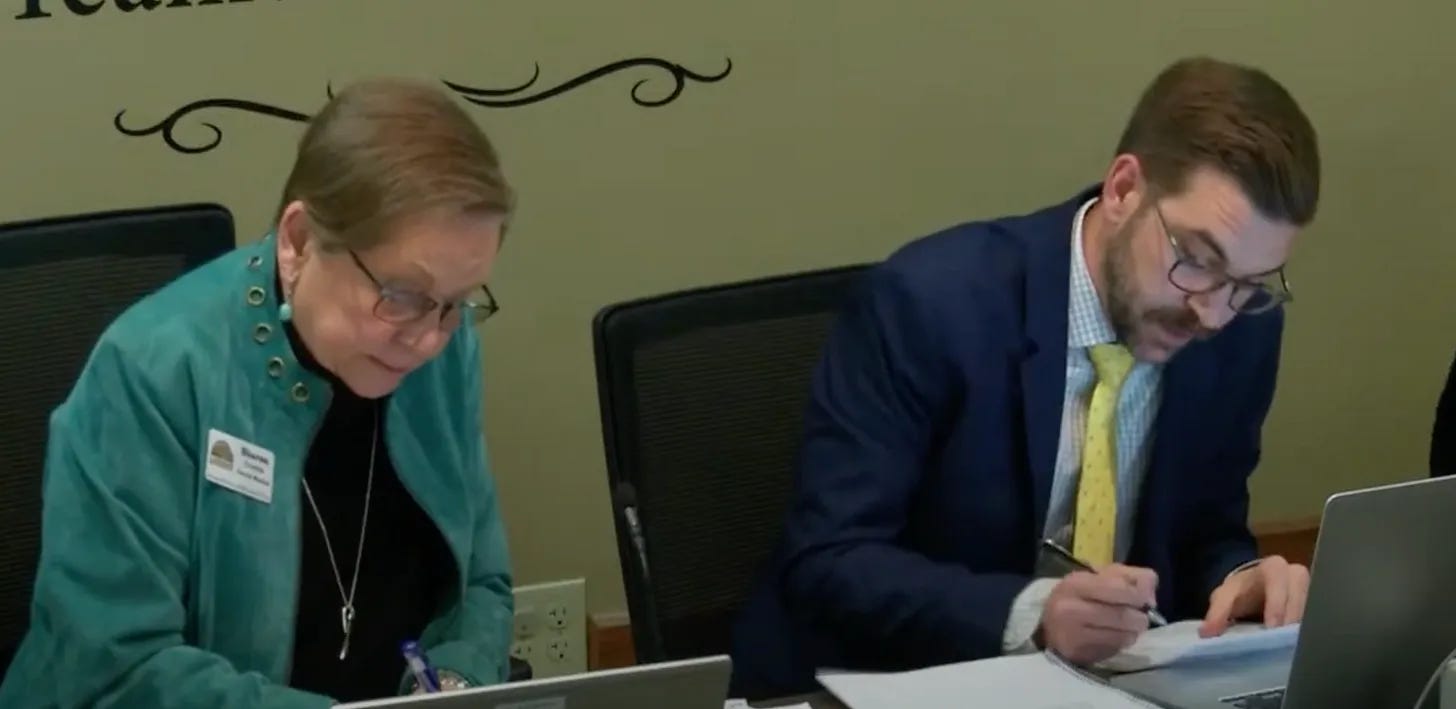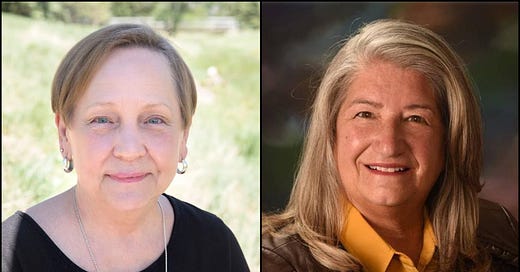Local electeds choose Cumbie for mayor, Jones for commission chair
Councilors and commissioners named their respective leaders, locking in progressive leadership at the city level and Republican leadership for the county.
The community has new leaders at both the municipal and county levels.
The Laramie City Council selected Councilor Sharon Cumbie to serve as the city’s mayor and Councilor Micah Richardson to serve as vice-mayor during the first meeting of the new year Tuesday. The ascension of Cumbie and Richardson to these leadership roles represents a continuation of explicitly progressive leadership.
Earlier that same day, the Albany County Commission voted 2-1 to install Republican Terri Jones as the commission chair — a move that represents a significant departure from the commission’s last four years of Democratic dominance and leadership under Commissioner Pete Gosar.
The mayor and the commission chair preside over their respective government bodies, guiding meetings and maintaining order. At both levels, the new leadership roles reflect the results of the 2024 election.
In last year’s Laramie City Council races, progressive candidates swept their respective ward contests. Cumbie — the only incumbent to be reelected — received more votes than any other candidate in any of the three council races.
At the same time, Republicans conquered the Albany County Commission when Thad Hoff defeated Brian Harrington in a race for an open seat and flipped the partisan balance of the county’s highest elected body.
A progressive mayor looks ahead
Cumbie was first elected to the Laramie City Council in 2020 and stepped into the role of vice-mayor two years ago when her colleague and political ally Brian Harrington was named mayor.
Following her appointment Tuesday, Cumbie said she feels prepared to lead.
“Former Mayor Harrington and I worked closely as mayor and vice-mayor, and approached it more like a partnership — where we engaged together in a lot of different activities and roles and functions, and that’s been helpful,” she said.

Cumbie was one of two councilors nominated for mayorship. The other nominee was Councilor Brandon Newman, who was nominated by a newcomer to the council, Matt Lockhart. (Lockhart was elected to represent Ward 3 during the most recent election. Of the four new councilors inducted Tuesday, he was the only one not affiliated with the progressive slate that dominated races in Wards 1 and 2.)
Though Lockhart and Newman voted to accept the latter’s nomination, they then joined their fellow councilors to endorse Cumbie’s mayorship in the unanimous final vote.
Throughout the meeting — Cumbie’s first as mayor and the new councilors’ first as elected officials — members of the governing body demonstrated an eagerness to dig into their responsibilities. Lockhart, for example, asked detailed questions of the fire chief about an EMS contract, while incoming Councilor Will Bowling pitched the idea of an additional work session to better understand board and commission liaison appointments.
Cumbie was impressed.
“It was exhilarating,” she said. “I felt like we’re going to have a good council.”
The new mayor said the councilors are “going to have our debates and misunderstandings” in the coming years, but Cumbie said her background in teaching and as a mental health nurse have prepared her for conflict management.
“One of my goals is to continue breaking down silos, building coalitions and collaboration among community members who are working on the same topic,” she said. “People want to be able to agreeably disagree. They want to feel free to put their ideas forward. And I really want to create an environment that encourages that kind of debate and dialogue.”
There’s no shortage of topics this new council is likely to debate. From the ongoing housing shortage to the deficiencies in the current rental housing code to the protection of local resources like the Casper Aquifer, Cumbie said the city has plenty of local challenges that are going to require open dialogue and collaboration. Add to this the issues external to Laramie that will nonetheless affect the city — such as climate change and federal- or state-imposed budgetary constraints — and it becomes quickly apparent the councilors will have their hands full.

The council will decide its official goals for the next year during a pair of meetings later this month. In looking to the future — of housing, transportation and city budgeting — Cumbie said it will be crucial to listen to the new, younger voices on council.
“I’m thrilled that we have younger people coming in,” she said. “I think it’s going to get younger people in town more involved, and get their voices heard.”
As Laramie and the wider world grapple with the interrelated challenges of growing income inequality and a worsening climate crisis, Cumbie said the next generation’s perspective is crucial.
“Some of us — like me, who bought my house 22 years ago for next to nothing compared to what it’s worth now — it’s hard for my generation that’s more solid financially to fully understand the challenges that are facing our younger generation,” Cumbie said. “So I think this is going to be important — really important.”
Jones once again county’s highest elected official
The 2024 election flipped the partisan balance of the three-member Albany County Commission, replacing outgoing Democrat Sue Ibarra with incoming Republican Thad Hoff.
During the first meeting of the new commission, Hoff nominated Commissioner Terri Jones to take over as chair, replacing Peter Gosar, who had served in the role for four years.
In the predictable 2-1 vote that followed, Gosar cast the sole dissenting vote against his own demotion.
Hoff is a moderate Republican and said his ascension to the commission would not represent a dramatic change to county leadership given the non-partisan nature of many of the issues facing the commission.
But Jones herself is farther to the right. In 2020, she spoke during a militia recruiting event at the Albany County Fairgrounds, calling on citizens to arm themselves in response to the Black Lives Matter protests. In a follow-up interview about the event, she claimed “the left” had fabricated the COVID-19 pandemic. Amid a push to limit development on the land above the Casper Aquifer — an effort Jones opposed — she said additional regulations would “financially rape” landowners. In 2023, she unsuccessfully fought another citizen effort to change the name of what was once called “Swastika Lake,” claiming the proposed name change was the work of “communists.” As chair, she will likely be less willing to pursue renewable energy projects than her predecessor.

Jones has served as the commission’s chair before.
She was first elected to the commission in 2016 and was serving as its chair when she was unseated by Ibarra in 2020. Jones returned to the commission in 2022, regaining a seat in an election that failed to flip the commission. For the past two years, Jones has served as the commission’s sole Republican member.
Jones’ return to the role of commission chair means she is officially the body’s leader once more. However, as the GOP-dominated commission’s more moderate Republican, Hoff — not Jones — will likely cast the deciding vote on any issue that splits along partisan lines.
Such issues are rare. But if and when they occur, Jones will likely come down on the right while Gosar will likely come down on the left — leaving Hoff with the decisive vote.
Before his first meeting concluded, one disagreement did fall to Hoff to decide.
The commission has until now alternated between morning and evening meetings — gathering at 9:30 a.m. on the first Tuesday of the month and at 6 p.m. on the third Tuesday.
In one of her first acts as commission chair, Jones introduced a resolution to change this by moving both meetings to 9:30 a.m.
“The county no longer believes regular evening meetings are necessary to meet the needs of the public,” she said, reading from the motion.
But Gosar said having alternating meeting times was a matter of inclusivity. He opposed the resolution.
“People work from 8-5,” Gosar said. “There’s a reason Cowboy Basketball plays — not at 9:30 in the morning — at 7 p.m. at night. There’s a reason that concerts are held after work, and that’s to give the opportunity to acquire attendance. Government should be no different. The more that attend, the better.”
Jones wasn’t convinced.
“People work all different hours,” she said. “So that’s conversation that I think is irrelevant, because some people are working at 6:30, no different than they are at 9:30 … The State of Wyoming operates from 8-5, we should do the same.”
With Gosar and Jones clear on their positions, the decision came down to the commission’s third and newest member.
Hoff sided with Jones.
“I feel, at least in my role as a steward, that folks should be able to reach out to us outside the meetings,” he said. “So that their attendance isn’t necessarily required, but their thoughts and wishes are conveyed to the commission via personal interactions. That would be my steerage towards daytime meetings.”
Hoff added consistent meetings would free county staff from working late on third Tuesdays.
“We have county employees that are missing out on family activities, meal time,” he said. “I don’t think that it’d be a detriment to the public interest.”
The commission passed the resolution 2-1 with Gosar dissenting. The meeting time changes go into effect immediately; the commission’s next meeting, on the third Tuesday of this month, will convene at 9:30 a.m.




